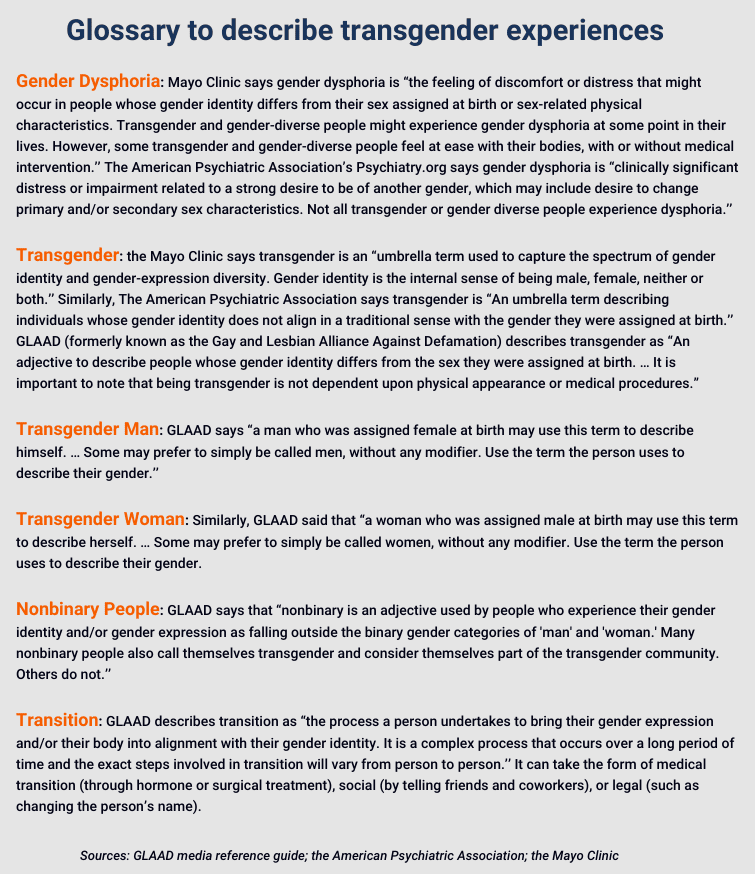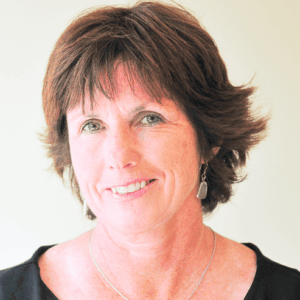In many ways it was just another basketball tournament.
Julie Woodbury had played in scores of them over her lifetime.
But this one was different.
Woodbury, a 54-year-old transgender Maine woman, was competing in the National Senior Games.
The tournament would be in Florida, which has banned transgender women from playing girls’ and women’s sports in public schools and colleges. It also banned teachers from discussing gender identity or sexual orientation in kindergarten through third grade.
Woodbury had conflicting emotions about competing in Florida, the first in a string of states to pass what critics have called “Don’t Say Gay’’ legislation.
“Everything that Florida is doing,” Woodbury said, “is trying to create an environment where trans people can’t exist.”
Woodbury had fully transitioned with surgery and hormone replacement therapy, along with changing several of her state and federal legal documents to reflect her female gender. She believed she had every right to play in the tournament. Still, she worried about protesters and she worried about her teammates.
What if there was a backlash against them because she was trans? Would referees make unfair calls against the team because of Woodbury?
In early May as the national competition loomed closer, Woodbury thought about the transgender girls and women in Florida and throughout the country who have been restricted from playing sports. Eighteen states have banned transgender females from playing at the college or high school level, after lawmakers argued that transgender women have an unfair biological advantage with stronger muscle mass, larger frames and higher testosterone levels.
“I wanted to play for them,” Woodbury said. “We should all be able to take space, to live our life and to not be bullied into the corners of society.”
Woodbury also didn’t want to give up on a lifelong dream. She had waited nearly five decades to transition from male to female. One of her biggest joys was playing basketball with a body that matched her true gender and befriending teammates who considered her family.
“There was a time when I didn’t want anyone to know,” she said.
“A time when I felt shame for being trans, but now I celebrate that. I have a group of friends who love and support me. I get to be me, and I’ll be damned if I’m going to let anyone diminish me.”
Woodbury also held onto the hope that she could have conversations with opponents, coaches or maybe even spectators, and help them understand what it’s like to be a transgender woman.
“We’re just people,” Woodbury said, “wanting acceptance and equality like any other woman.”
Questions at an early age
For nearly 40 years, the basketball court offered Julie Woodbury a place to escape her inner turmoil.
At an early age, she wondered why her body was different from other girls. Assigned male at birth in 1968, she grew up in a conservative Catholic family. Her dad was a police officer and no one talked about gender identity. Woodbury didn’t understand why she wanted to wear girls’ clothing.
“It was confusing because you couldn’t find information, and what I found was very disconcerting, basically everything was like if a person was a transvestite or a transexual, there is something wrong with you.”
Early in life, Woodbury said she learned that complimenting her classmates’ shoes or dresses sparked ridicule. Singing for the Glee Club triggered taunts.

“I was just constantly on guard, trying to keep my feelings hidden,” she said.
In the early 1980s at Portland High School, Woodbury sought a place to fit in. She found refuge on the basketball court. There, her nearly 6-foot frame and shooting skills earned her teammates’ respect.
“I went into sports so I wouldn’t be bullied anymore,” she said. “Basketball was a coping mechanism. It allowed me to have this jock persona.”
Her team excelled and won a state championship, but off the court it was “a lonely life,” Woodbury said. “I kept to myself.”
Woodbury later played basketball at Worcester Polytechnic Institute. During her sophomore year, she went on a blind date and met Georgianna, a girl she felt comfortable and safe with. Eventually, Woodbury confided feelings she had never shared with anyone.
“I feel like I have the soul of a girl,” Woodbury explained to Georgianna in a letter. “This is part of me, and it’s not the only part of me, but sometimes it needs to be expressed.”
Georgianna didn’t understand what it meant to be transgender, but she reassured Woodbury, “that’s a piece of you that I’ll learn to love, just like I love the rest of you.”
Years later, Woodbury and Georgianna married in 1995. The thought of Woodbury transitioning from male to female was put on the back burner as the couple had two daughters and focused on raising a family in southern Maine.
Woodbury earned a good wage delivering packages for FedEx, but decades of keeping her identity secret began to take a mental toll.
Instinctively, she knew, “I don’t think I’m a woman, I am a woman.”
A counselor advised Woodbury to make changes in her life to relieve the distress she felt over her male body, but Woodbury worried how those decisions would affect her spouse and daughters.
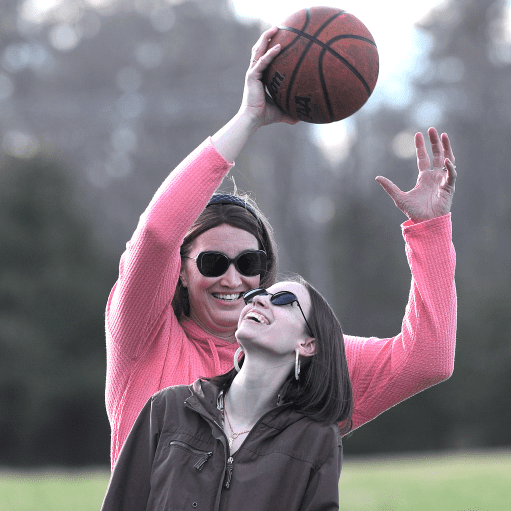
Georgianna had recently been diagnosed with multiple sclerosis, and Woodbury did not want to add stress to the family.
“So I just shut my feelings down,” she said. “I tried to put it away, like I made my choice, and I’m grateful that I have this wife that loves me and my two beautiful daughters.”
As she had done for much of her life, Woodbury sought solace in basketball. A competitive player, she played aggressively in the men’s recreational league to vent her angst. But after suffering several injuries, a doctor urged her to retire.
“That really hit me hard,” she said. “I tried lifting weights instead but I couldn’t get any muscle on my body, and I was just falling into more and more depression.”
As she gained more weight, her blood pressure spiked. Woodbury’s mental and physical health continued to deteriorate over the next several years. In 2015, Woodbury told her wife she could no longer pretend to be a man.
“I need to feel better,” she told Georgianna. “I feel like I’m dying.”
In 2016, Woodbury began taking hormones to transition her body from male to female.
In a letter explaining her feelings to one of her daughters, Woodbury wrote: “I’ve suffered with varying degrees of gender dysphoria since I was very young, around the age of four or five, when I learned my body was very different from other girls … I have experienced anxiety, shame, depression, moodiness, an aching numbness and an intense frustration relating to the fact I feel a wrongness and disconnection to this body I inhabit.”
While taking the feminizing hormones, Woodbury quickly lost weight and curves replaced muscle, she said. She also underwent gender-affirming surgery and sought therapy to soften her voice.
Though Georgianna supported the transition, she worried how it would affect their relationship. Instead of growing apart, she said, the couple grew closer. Woodbury was finally content, comfortable in her body.
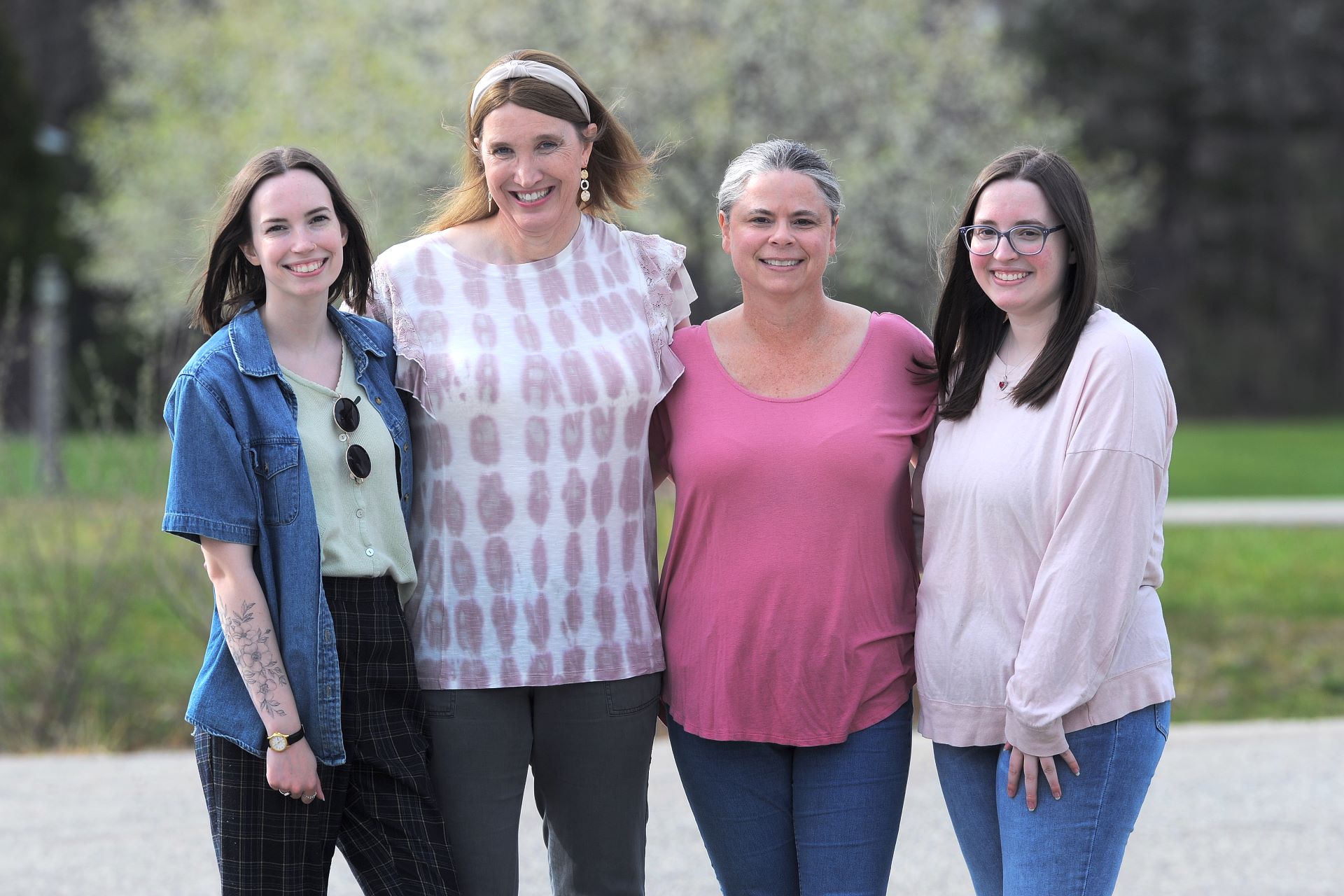
“She’s the love of my life,” Georgianna said. “I was ready for her to transition because I wanted her to be happy. I just couldn’t have imagined life without her.”
Basketball brings joy
At age 49, Woodbury finally fulfilled a longtime wish.
She joined the Maine Senior Games women’s basketball team and for the first time, walked onto the court in a body that matched her true gender.
“It was pure joy,” she said.
But she worried about how other players would react to a transgender teammate.
“If I was going to make people uncomfortable, I wasn’t going to play,” she said.
None of the 36 female players objected, said Deb Smith, who has organized the league’s games and practices for 22 years.
“Julie is a woman,” said Smith. “That’s who she is. Why would I say you can’t play with us? Nobody came to me and said, ‘If she is trans, she shouldn’t be here.’ ”
Players in the senior league range in age from 45 to 76 and are divided into age brackets. Instead of having five players on the court, they compete 3-on-3 in halfcourt games during regional and national tournaments.
The league’s philosophy, Smith said, is about inclusion and offering a place for aging women to continue playing the sport they love.
“Julie loves basketball,” Smith said. “And that’s all that matters.”
One of the players was Cathy Iaconeta, who hadn’t seen Woodbury since they graduated together from Portland High in 1986.
Like Woodbury, Iaconeta shared a passion for basketball. A point guard, she led her high school team to two state championships, played for the University of Maine and was inducted into the Maine Basketball Hall of Fame.
In her later years, Iaconeta stopped playing basketball while working and raising her daughter. When a friend told her about the seniors league, Iaconeta decided to get back in the game.
Iaconeta’s twin sister, who also played basketball, mentioned that Woodbury had also joined the league.
“Chrissy (my sister) was on Facebook with Julie and knew that she had transitioned,” Iaconeta said. “I was like, OK, I guess I’ll see her at the gym.”
Iaconeta had respected Woodbury when she played on the high school boys’ team.
“She was a great shooter,” Iaconeta remembered. “She was always out there playing hard, working hard, just trying to do the right thing to contribute to her team.”
Iaconeta gained new admiration for Woodbury after learning about the bullying and turmoil her former classmate endured.
“I couldn’t imagine going through high school and middle school and most of your life hiding who you are,” Iaconeta said. “And then having the courage and strength to say, ‘I’m not happy this way, and I’m gonna do what I need to do to be who I am.’ That’s something to be proud of.”
The team, Iaconeta said, has never wavered in its support of Woodbury.
“It’s great to compete again, socialize and be with people who have the same passion,” Iaconeta said. “But we’re also very, very supportive of one another and what’s going on in our lives outside of basketball.”
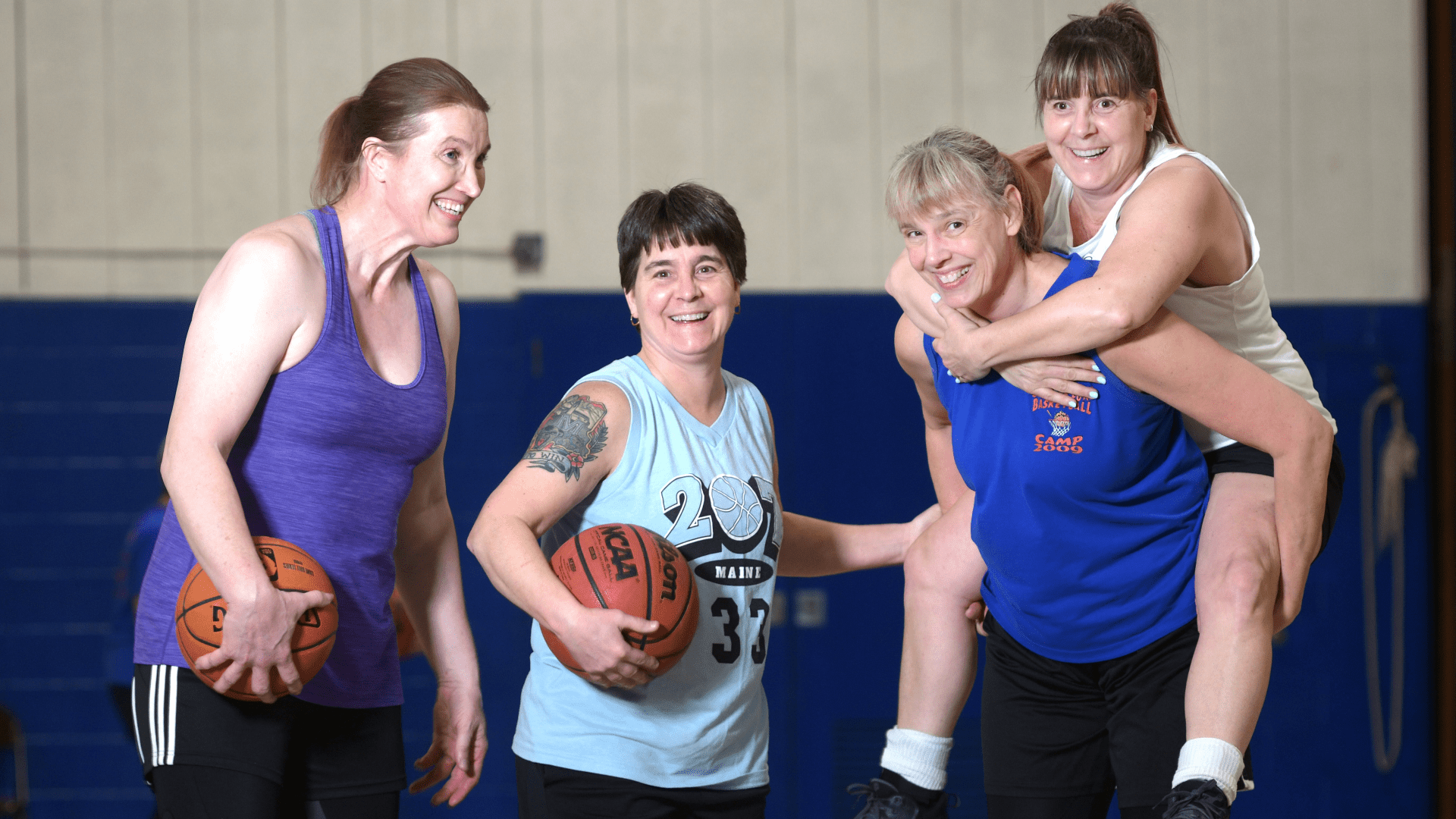
When their “207” team earned a spot in the 2019 national competition in Albuquerque, N.M., the women were thrilled.
“To compete in a national tournament in your 50s and 60s, it’s like going to the Olympics,” said Smith, the league organizer who also plays for the Maine “Flashes” in the 65- to 69-year-old division. “It’s like going to the Final Four.”
Woodbury shared Smith’s enthusiasm, but also feared being outed or challenged. Her teammates sought to ease her concerns.
“We weren’t gonna let anybody single her out, discriminate against her or make her feel like she shouldn’t be there,” Iaconeta said.
Woodbury was one of the taller players among the hundreds of women at the tournament, but there were several others who were stronger, taller and faster, said Diana Manduca, a former Colby College basketball player and one of Woodbury’s coaches.
“Julie has gone through all the biological changes,” Manduca said. “She doesn’t have the advantages she used to have. She was one of the top players in the tournament, but she wasn’t way faster or stronger than anyone else who was playing.”
Woodbury was also not a player who tossed elbows and muscled her way to the basket, Manduca said.
“She likes to glide to the hoop instead of bullying her way,” the coach added.
As the “207” team played in the semifinal game, league coordinator Smith learned the opposing team had issued a challenge. If the Maine team beat them, it would lodge a complaint because Woodbury was transgender.
Years earlier, Woodbury had changed her driver’s license, birth certificate and social security card to reflect her female gender. Smith quietly gathered Woodbury’s license and showed it to the tournament director. She kept the protest quiet until the game was over.
“I didn’t think Julie or her teammates could handle this emotionally as they played,” Smith said. “It was gut-wrenching. I hated every minute of it. This was just not OK.”
Woodbury’s team won and the challenge, Manduca said, was denied.
“They didn’t have a leg to stand on,” Manduca said. “They were looking for an excuse for why they lost, but it was an insult to all of the female basketball players.”
Woodbury’s team advanced to the final but lost, earning silver medals. Second place in the national tournament was still a tremendous achievement, Manduca said, yet Woodbury had some regrets. She didn’t play as aggressively as she could have, not wanting to draw attention.
“I was trying to stay under the radar,” Woodbury said.
CLICK HERE TO SHARE YOUR THOUGHTS ON THIS STORY
Three years later, the “207” team had another shot at the gold medal during the 2022 National Seniors Games in Fort Lauderdale, Fla. The players were excited to compete again nationally, and Woodbury tried to put her anxiety about Florida’s anti-trans laws aside.
“I’m a lot more comfortable at this stage of my transition,” she said before flying to Fort Lauderdale. “I’m going to do the best I can and not muddy my brain with how I might be perceived.”
Manduca noticed a difference in Woodbury’s confidence once the team began competing in Florida. The soft-spoken woman known for her gentle nature “held her head up a little bit higher and was willing to stand up for herself more,” Manduca said.
As Woodbury’s team progressed to a playoff game, it struggled with a couple of injured players. Manduca knew Woodbury was also wrestling with her own emotions.
During a timeout, she looked Woodbury in the eye and told her: “Don’t be afraid to be the best player on the court. We need you right now.”
Woodbury returned to the game with renewed confidence and helped her team advance to the semifinals.
Though they ultimately lost in the championship game and again earned silver medals instead of gold, Woodbury and her teammates were proud. They had faced former pro players and held their own, said Manduca.
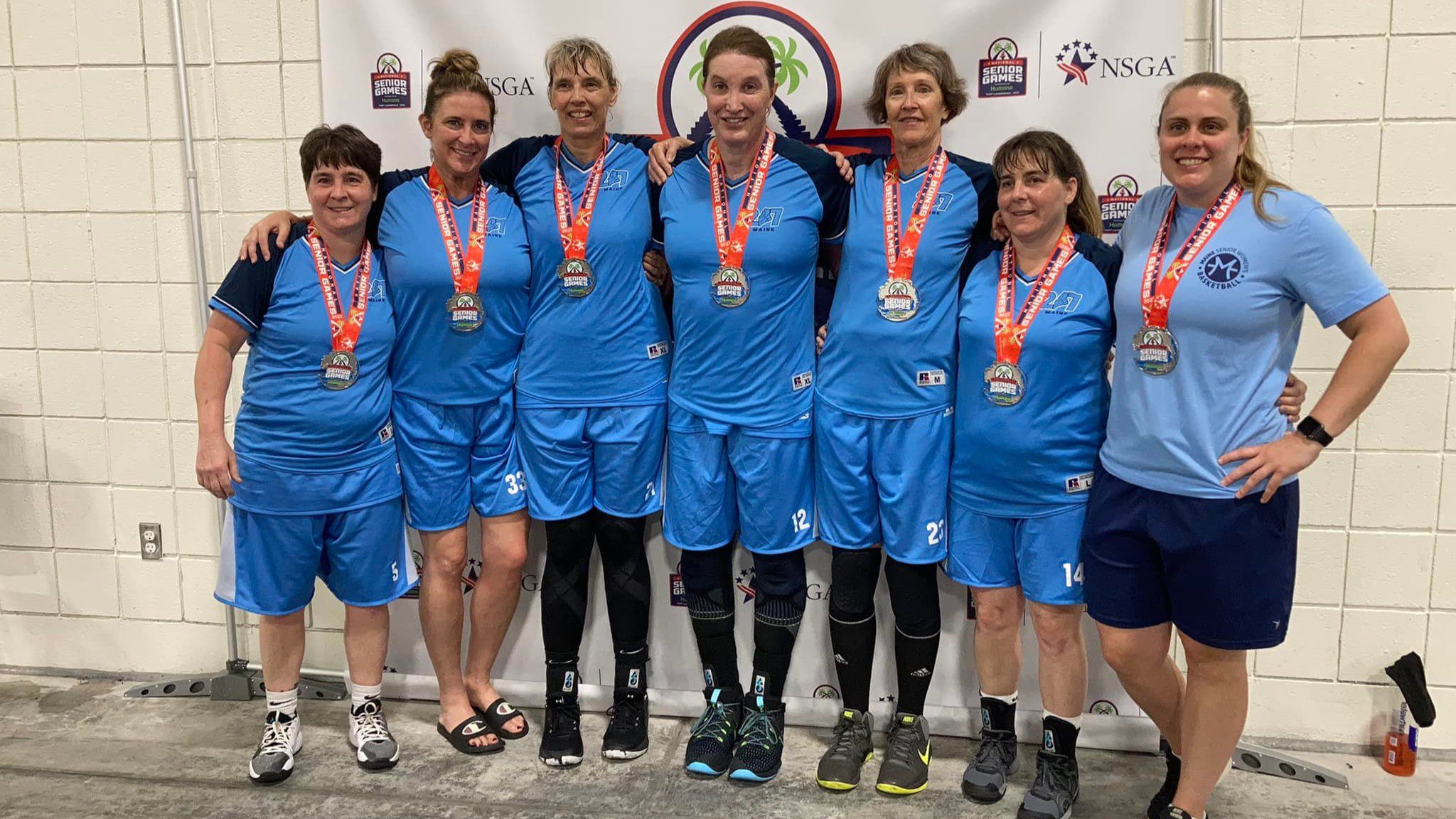
Woodbury was also buoyed by conversations with opponents who complimented her shooting and appreciated her team’s sportsmanship.
Still, one Florida player remained skeptical of Woodbury. The “207” players had beaten the women’s Florida team in Albuquerque and again in Fort Lauderdale. Woodbury knew the opposing player was upset and decided to talk with her.
“She asked me where I played at college,” Woodbury said.
When Woodbury explained she played at Worcester Polytechnic Institute, her opponent asked: “For the men’s or women’s team?”
“The men’s team,” Woodbury replied. “She was like, ‘I have a problem with that,’ and then she asked me all kinds of questions about transitioning.”
Woodbury said she explained that gender-affirming surgery and hormone replacement therapy had reduced her muscle and strength. The conversation did little to sway the Florida player’s mind.
“She simply doesn’t believe that trans women are women,” Woodbury said.
After returning to Maine, Woodbury and her teammates have already begun planning for the 2023 tournament. Along with pursuing the championship title and a gold medal, Woodbury hopes to continue sharing her story.
“When people get to know me, I’m hoping that being trans won’t matter,” she said. “That they’ll understand I’m not playing because I want to cheat them out of something or destroy women’s sports. I’m just a woman who loves basketball and loves her team.”
This series was financially supported by The Bingham Program and the Margaret E. Burnham Charitable Trust. We encourage you to share your thoughts on this series by visiting this page. Barbara A. Walsh can be reached at gro.r1754664109otino1754664109menia1754664109meht@1754664109arabr1754664109ab1754664109.
